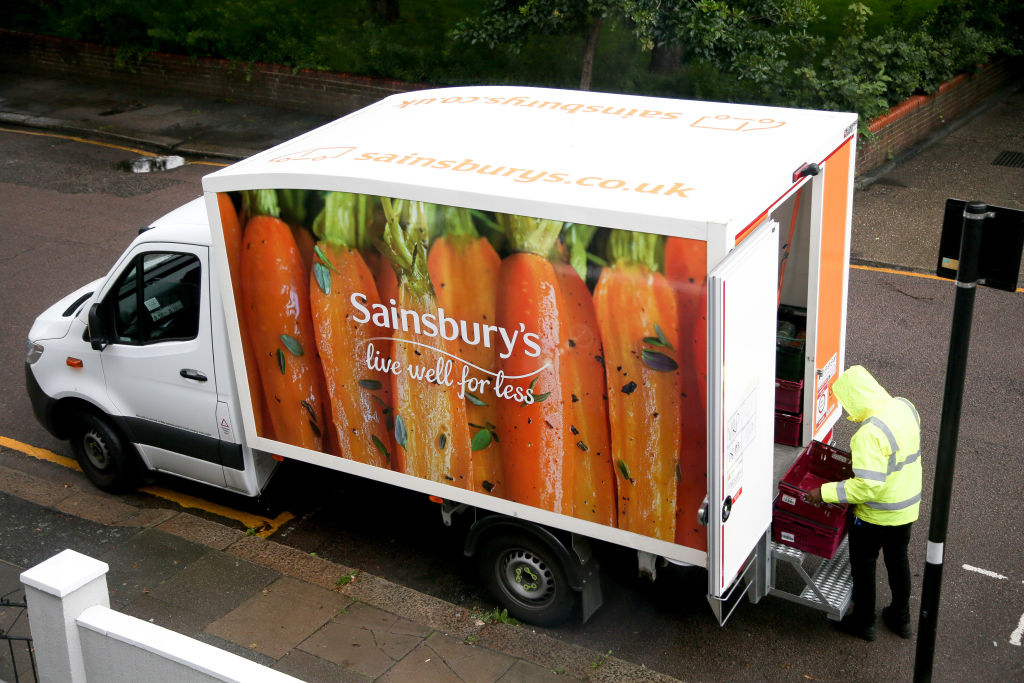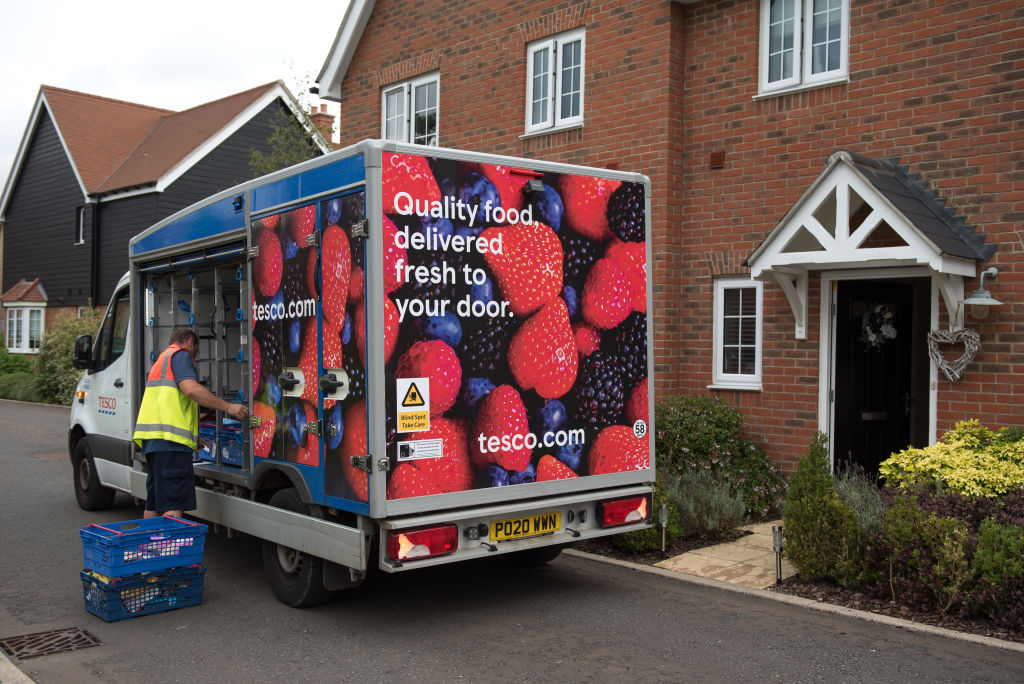Cheapest online food shopping: delivery costs compared, plus are online grocery orders more expensive?
We explain how to get the cheapest online food shopping, compare supermarket delivery charges and reveal whether supermarkets really charge more for online orders
Rachel Wait

Knowing which supermarket offers the cheapest online food shopping is really handy for parents running a busy household on a budget.
With food prices still high, you might already be shopping at the cheapest supermarket, but if you want your food shop delivered straight to your door, you'll need to pay for the convenience, joining the 43% of Brits who place a delivery order from a supermarket at least once a month, according to online supermarket Britsuperstore. It's a good idea to make sure you link your supermarket loyalty card to your online grocery account to maximise any points and perks you earn.
Here we look at how you can make sure you're getting the cheapest online food shopping, how much the biggest supermarkets charge for delivery, and whether supermarkets charge more for groceries brought online. We'll also compare the pros and cons of online grocery shopping to help you make the right choice for your family.
Cheapest online food shopping
To get the cheapest online food shopping, you need to be flexible about the day and time you get your shopping delivered. Supermarkets charge more for delivery at peak times so getting your food shop delivered in the early evening or on a Saturday is the most expensive time, but if you get it delivered later in the evening mid-week, you'll likely get the cheapest delivery price possible.
Richard Price, owner of Britsuperstore, says: "Delivery charges are subject to change week on week, but they do largely remain at stable and consistent rates. It appears that the late-night slots are always offering the cheapest value, and therefore the best value-for-money prices and this is something consumers should be taking into consideration when placing an order."
If you get your food shopping delivered every week, then it's worthwhile considering a delivery pass from your chosen supermarket, where you can pay upfront for deliveries for the month, six months or a year, which can lead to significant cost savings.

How do supermarket delivery costs compare?
If you want to get your food shop delivered straight to your door, you’ll need to factor in delivery fees. These will vary depending on the supermarket and the time and date of your delivery. Midweek slots tend to be cheaper than weekends, for instance.
Parenting advice, hot topics, best buys and family finance tips delivered straight to your inbox.
You can usually pay as you go or opt for a delivery pass which covers you for up to a year and means you can get free delivery any time.
Asda delivery costs
- Minimum spend: £40
- Cost: Between £1 and £5. An additional fee of £3 applies to orders under £40.
- Delivery pass: The Anytime Delivery Pass is available for 12 months at a cost of £6.50 a month or a £65 one-off payment. The Midweek 12-month pass for deliveries on Tuesdays, Wednesdays and Thursdays costs £35.
Morrisons delivery costs
- Minimum spend: £25
- Cost: Between £1.50 and £6.
- Delivery pass: The Anytime Delivery Pass costs £70 for a year, £45 for six months or £8 monthly. The Midweek Delivery Pass for deliveries on Tuesdays, Wednesdays and Thursdays costs £40 a year, £25 for six months or £5 monthly.
Sainsbury's delivery costs
- Minimum spend: £25
- Cost: Between £1 and £5.50 for orders over £40. Orders under £40 will be charged a £7 delivery charge.
- Delivery pass: The Anytime Delivery Pass costs £80 for a year, £43 for six months or £7.50 monthly. The Midweek Delivery Pass for deliveries on Tuesdays, Wednesdays and Thursdays costs £40 a year or £4 monthly.
Tesco delivery costs
- Minimum spend: £50
- Cost: Between £3 and £7 if you want a fixed one-hour slot, or between £2.50 and £4 if you are happy with a flexible slot. An additional £4 is charged if you order less than £50.
- Delivery pass: The Anytime Delivery 12-month plan costs £6.99 a month or £83.88 upfront, while the 6-month plan costs £7.99 a month or £47.94 upfront. The Off Peak Delivery 12-month plan costs £3.99 a month or £47.88 upfront, while the 6-month plan costs £4.99 a month or £29.94 upfront.
Ocado delivery costs
- Minimum spend: £40
- Cost: Between £0 and £6.99 depending on slot availability. If your order is less than £75, there is a minimum charge of £2.99 and a maximum of £6.99.
- Delivery pass: The Ocado Anytime Smart Pass costs £89.99 for 12 months or £49.99 for six months. The Midweek pass costs £39.99 for 12 months or £22.49 for six months.
Waitrose delivery costs
- Minimum spend: £40
- Cost: £3
- Delivery pass: n/a
Do supermarkets charge more for online orders?
Online grocery orders cost more than shopping in store as delivery costs are added on top. But without the delivery costs, the price you pay for the items in your online food shop will be exactly the same price as those in store on the day of delivery. This is an important point to note as when you check out your online ahead of the delivery day, you're actually checking out with estimated prices, and come delivery day, these could have gone up or down.
You payment is actually taken on the day of delivery, where exact prices will have been confirmed. If you're on a tight budget, it can be helpful to check your digital receipt that is usually emailed to you as soon as payment has been taken. If anything has gone up in price and you are not happy to pay the extra, you can return it to your delivery driver and get your money back.
Supermarkets review their prices regularly for a number of reasons. On its website, for example, Sainsbury's states: "There are lots of factors which can affect pricing, from costs of raw materials, to the production and packaging and even transportation."
You should still be able to buy a wide selection of products as you can in store, but during busy periods you might find your favourites have sold out.

Pros and cons of buying groceries online
It's worthwhile weighing up the advantages and drawbacks of doing your food shopping online to determine whether it's actually the right choice for your family.
Pros of doing your food shop online
- Convenient (especially if you have young kids)
- You can check your cupboards as you shop to avoid buying unnecessary items
- Easier to stick to a list and avoid impulse purchases
- Easy to find offers and discounts
- Quick to shop once you've built up a list of favourites
- Saves on travel time and petrol costs
- You can add items to your trolley at any time of day
- Can revise trolley numerous times up until the night before the delivery day
- Anything you're not happy with can be handed back to the delivery driver for a refund
Cons of online food shopping
- You have to pay delivery costs
- You have to book your delivery slot in advance
- They might not have all the items you want, or you might be sent a substitute you don't want
- Miss out on end-of-day yellow sticker discounts
- You can't choose items with the longest shelf life
- Cheapest supermarkets don't deliver
- Cheapest delivery slots aren't the most convenient
If you shop at Tesco, make sure you know how to collect more Clubcard points, how to spend your Clubcard vouchers and what to do if you are worried about your Tesco vouchers expiring. You can always use this trick to reclaim up to two years of lost or unused Clubcard vouchers. If you're not sure which supermarket to shop at, we've compared shopping baskets to see if Aldi is cheaper than Lidl, if Waitrose is more expensive than M&S Food, and if Tesco is cheaper than Tesco Express.
Sarah is GoodtoKnow’s Money Editor. After Sarah graduated from University of Wales, Aberystwyth, with a degree in English and Creative Writing, she entered the world of publishing in 2007, working as a writer and digital editor on a range of titles including Real Homes, Homebuilding & Renovating, The Money Edit and more. When not writing or editing, Sarah can be found hanging out with her rockstar dog, getting opinionated about a movie or learning British Sign Language.
- Rachel WaitPersonal finance expert